SSC110 - Socialization Theories: Comparing and Contrasting Theories
VerifiedAdded on 2022/08/27
|7
|1867
|36
Project
AI Summary
This assignment explores three major theories of socialization and social identity formation: Role Learning Theory, Symbolic Interactionism, and Psychoanalytic Theory. The student analyzes how each theory contributes to understanding socialization, discussing the societal context of socialization, the role of symbols in shaping individual meaning, and the influence of psychodynamic components like the Id, Ego, and Superego. The paper examines the development of self and identity based on social expectations, the impact of communication and symbols, and the role of early childhood experiences and parental influence. It also considers the interplay between structure and agency in shaping individual behavior. The conclusion summarizes how these theories can be used to determine socialization, highlighting the importance of environment, meaning, and the development of conscience in the process. References are provided for further research.
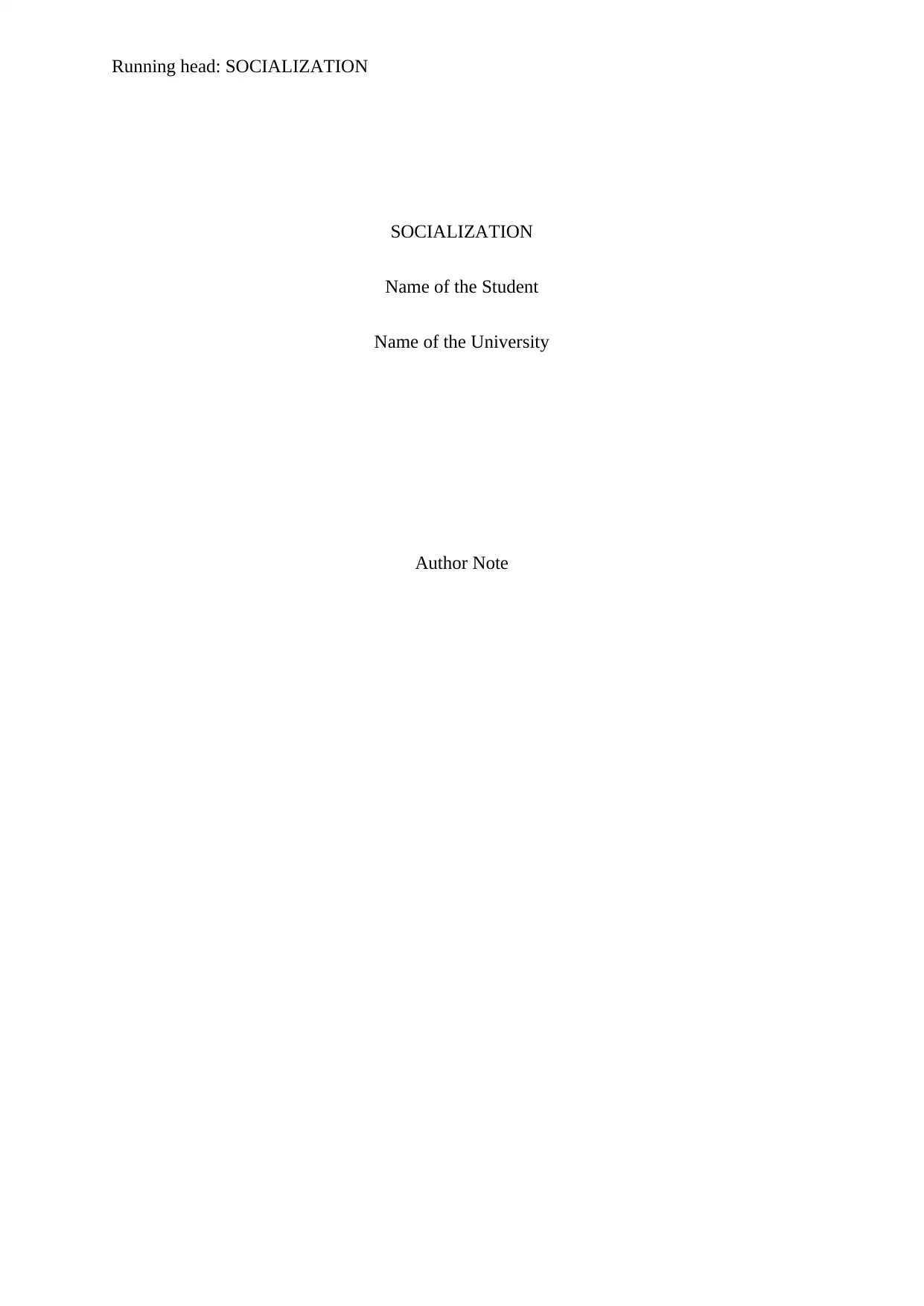
Running head: SOCIALIZATION
SOCIALIZATION
Name of the Student
Name of the University
Author Note
SOCIALIZATION
Name of the Student
Name of the University
Author Note
Paraphrase This Document
Need a fresh take? Get an instant paraphrase of this document with our AI Paraphraser
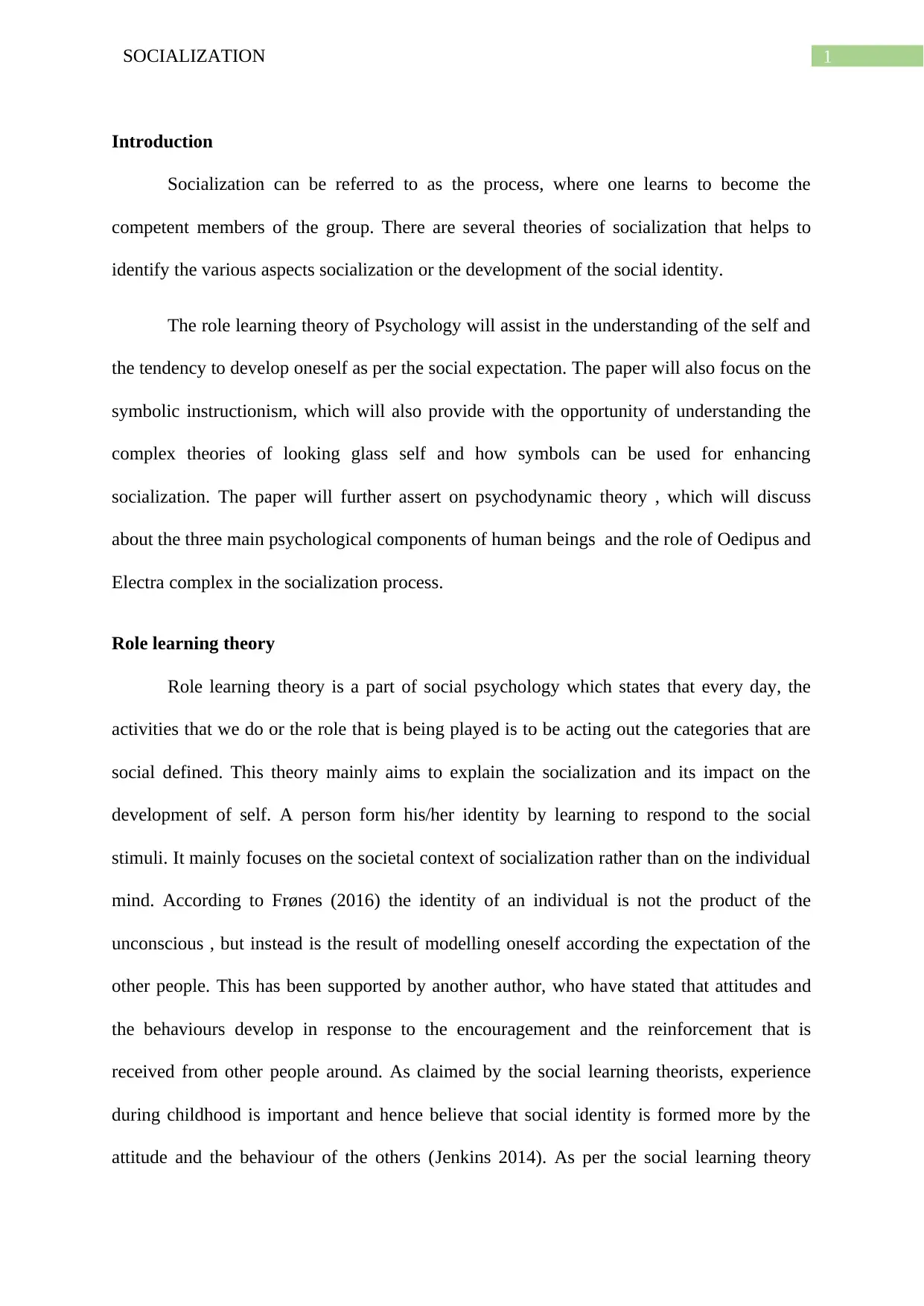
1SOCIALIZATION
Introduction
Socialization can be referred to as the process, where one learns to become the
competent members of the group. There are several theories of socialization that helps to
identify the various aspects socialization or the development of the social identity.
The role learning theory of Psychology will assist in the understanding of the self and
the tendency to develop oneself as per the social expectation. The paper will also focus on the
symbolic instructionism, which will also provide with the opportunity of understanding the
complex theories of looking glass self and how symbols can be used for enhancing
socialization. The paper will further assert on psychodynamic theory , which will discuss
about the three main psychological components of human beings and the role of Oedipus and
Electra complex in the socialization process.
Role learning theory
Role learning theory is a part of social psychology which states that every day, the
activities that we do or the role that is being played is to be acting out the categories that are
social defined. This theory mainly aims to explain the socialization and its impact on the
development of self. A person form his/her identity by learning to respond to the social
stimuli. It mainly focuses on the societal context of socialization rather than on the individual
mind. According to Frønes (2016) the identity of an individual is not the product of the
unconscious , but instead is the result of modelling oneself according the expectation of the
other people. This has been supported by another author, who have stated that attitudes and
the behaviours develop in response to the encouragement and the reinforcement that is
received from other people around. As claimed by the social learning theorists, experience
during childhood is important and hence believe that social identity is formed more by the
attitude and the behaviour of the others (Jenkins 2014). As per the social learning theory
Introduction
Socialization can be referred to as the process, where one learns to become the
competent members of the group. There are several theories of socialization that helps to
identify the various aspects socialization or the development of the social identity.
The role learning theory of Psychology will assist in the understanding of the self and
the tendency to develop oneself as per the social expectation. The paper will also focus on the
symbolic instructionism, which will also provide with the opportunity of understanding the
complex theories of looking glass self and how symbols can be used for enhancing
socialization. The paper will further assert on psychodynamic theory , which will discuss
about the three main psychological components of human beings and the role of Oedipus and
Electra complex in the socialization process.
Role learning theory
Role learning theory is a part of social psychology which states that every day, the
activities that we do or the role that is being played is to be acting out the categories that are
social defined. This theory mainly aims to explain the socialization and its impact on the
development of self. A person form his/her identity by learning to respond to the social
stimuli. It mainly focuses on the societal context of socialization rather than on the individual
mind. According to Frønes (2016) the identity of an individual is not the product of the
unconscious , but instead is the result of modelling oneself according the expectation of the
other people. This has been supported by another author, who have stated that attitudes and
the behaviours develop in response to the encouragement and the reinforcement that is
received from other people around. As claimed by the social learning theorists, experience
during childhood is important and hence believe that social identity is formed more by the
attitude and the behaviour of the others (Jenkins 2014). As per the social learning theory
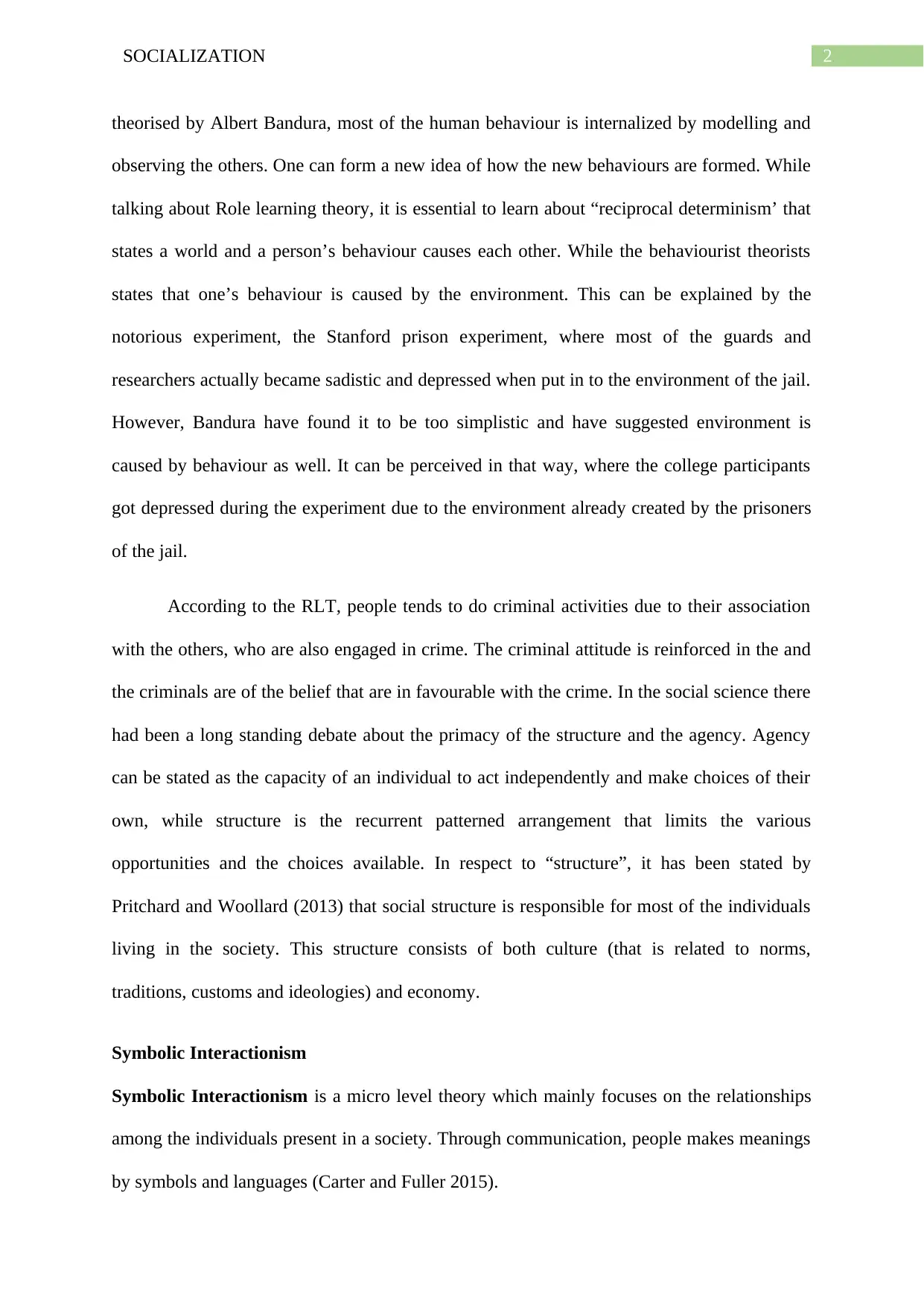
2SOCIALIZATION
theorised by Albert Bandura, most of the human behaviour is internalized by modelling and
observing the others. One can form a new idea of how the new behaviours are formed. While
talking about Role learning theory, it is essential to learn about “reciprocal determinism’ that
states a world and a person’s behaviour causes each other. While the behaviourist theorists
states that one’s behaviour is caused by the environment. This can be explained by the
notorious experiment, the Stanford prison experiment, where most of the guards and
researchers actually became sadistic and depressed when put in to the environment of the jail.
However, Bandura have found it to be too simplistic and have suggested environment is
caused by behaviour as well. It can be perceived in that way, where the college participants
got depressed during the experiment due to the environment already created by the prisoners
of the jail.
According to the RLT, people tends to do criminal activities due to their association
with the others, who are also engaged in crime. The criminal attitude is reinforced in the and
the criminals are of the belief that are in favourable with the crime. In the social science there
had been a long standing debate about the primacy of the structure and the agency. Agency
can be stated as the capacity of an individual to act independently and make choices of their
own, while structure is the recurrent patterned arrangement that limits the various
opportunities and the choices available. In respect to “structure”, it has been stated by
Pritchard and Woollard (2013) that social structure is responsible for most of the individuals
living in the society. This structure consists of both culture (that is related to norms,
traditions, customs and ideologies) and economy.
Symbolic Interactionism
Symbolic Interactionism is a micro level theory which mainly focuses on the relationships
among the individuals present in a society. Through communication, people makes meanings
by symbols and languages (Carter and Fuller 2015).
theorised by Albert Bandura, most of the human behaviour is internalized by modelling and
observing the others. One can form a new idea of how the new behaviours are formed. While
talking about Role learning theory, it is essential to learn about “reciprocal determinism’ that
states a world and a person’s behaviour causes each other. While the behaviourist theorists
states that one’s behaviour is caused by the environment. This can be explained by the
notorious experiment, the Stanford prison experiment, where most of the guards and
researchers actually became sadistic and depressed when put in to the environment of the jail.
However, Bandura have found it to be too simplistic and have suggested environment is
caused by behaviour as well. It can be perceived in that way, where the college participants
got depressed during the experiment due to the environment already created by the prisoners
of the jail.
According to the RLT, people tends to do criminal activities due to their association
with the others, who are also engaged in crime. The criminal attitude is reinforced in the and
the criminals are of the belief that are in favourable with the crime. In the social science there
had been a long standing debate about the primacy of the structure and the agency. Agency
can be stated as the capacity of an individual to act independently and make choices of their
own, while structure is the recurrent patterned arrangement that limits the various
opportunities and the choices available. In respect to “structure”, it has been stated by
Pritchard and Woollard (2013) that social structure is responsible for most of the individuals
living in the society. This structure consists of both culture (that is related to norms,
traditions, customs and ideologies) and economy.
Symbolic Interactionism
Symbolic Interactionism is a micro level theory which mainly focuses on the relationships
among the individuals present in a society. Through communication, people makes meanings
by symbols and languages (Carter and Fuller 2015).
⊘ This is a preview!⊘
Do you want full access?
Subscribe today to unlock all pages.

Trusted by 1+ million students worldwide
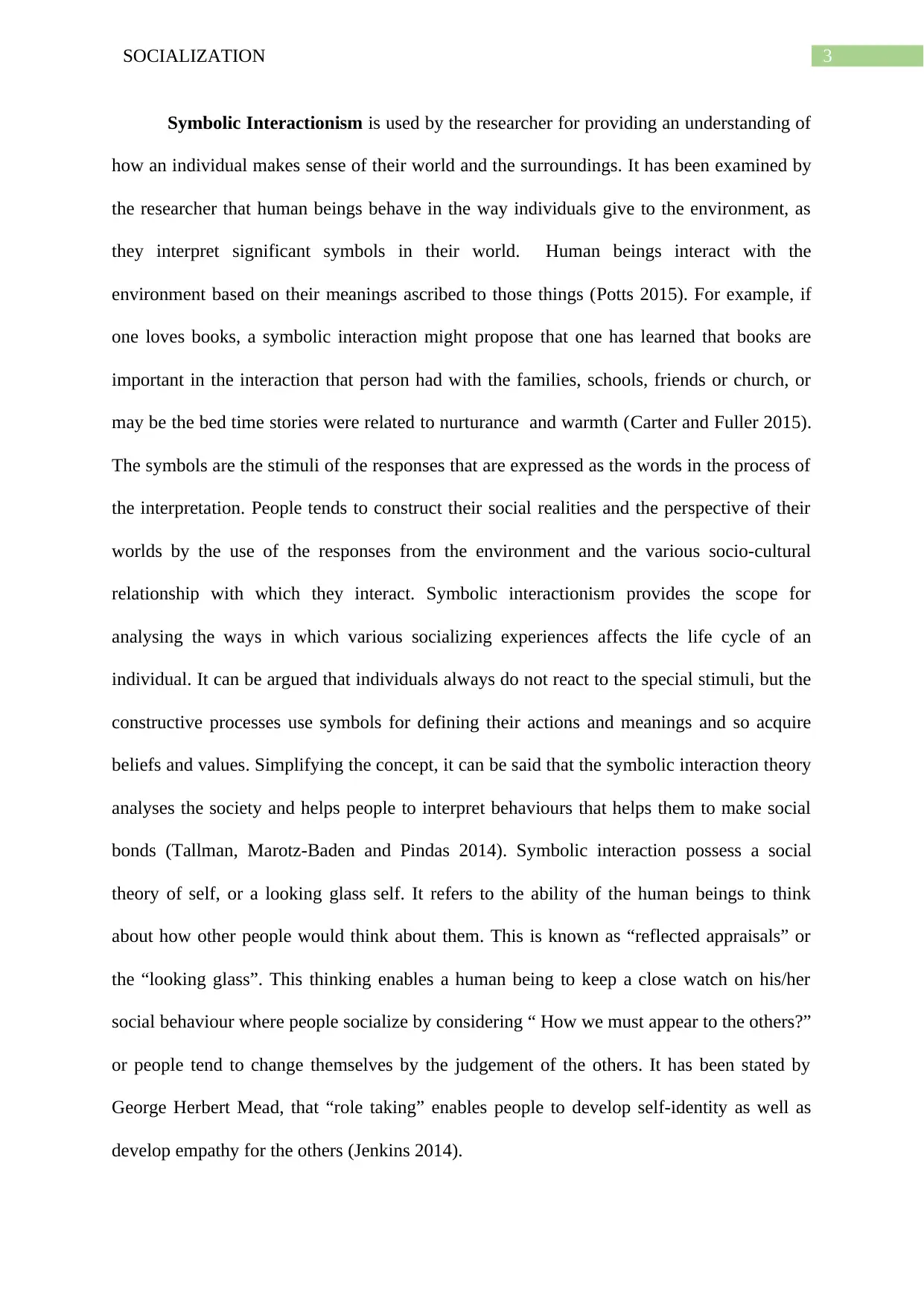
3SOCIALIZATION
Symbolic Interactionism is used by the researcher for providing an understanding of
how an individual makes sense of their world and the surroundings. It has been examined by
the researcher that human beings behave in the way individuals give to the environment, as
they interpret significant symbols in their world. Human beings interact with the
environment based on their meanings ascribed to those things (Potts 2015). For example, if
one loves books, a symbolic interaction might propose that one has learned that books are
important in the interaction that person had with the families, schools, friends or church, or
may be the bed time stories were related to nurturance and warmth (Carter and Fuller 2015).
The symbols are the stimuli of the responses that are expressed as the words in the process of
the interpretation. People tends to construct their social realities and the perspective of their
worlds by the use of the responses from the environment and the various socio-cultural
relationship with which they interact. Symbolic interactionism provides the scope for
analysing the ways in which various socializing experiences affects the life cycle of an
individual. It can be argued that individuals always do not react to the special stimuli, but the
constructive processes use symbols for defining their actions and meanings and so acquire
beliefs and values. Simplifying the concept, it can be said that the symbolic interaction theory
analyses the society and helps people to interpret behaviours that helps them to make social
bonds (Tallman, Marotz-Baden and Pindas 2014). Symbolic interaction possess a social
theory of self, or a looking glass self. It refers to the ability of the human beings to think
about how other people would think about them. This is known as “reflected appraisals” or
the “looking glass”. This thinking enables a human being to keep a close watch on his/her
social behaviour where people socialize by considering “ How we must appear to the others?”
or people tend to change themselves by the judgement of the others. It has been stated by
George Herbert Mead, that “role taking” enables people to develop self-identity as well as
develop empathy for the others (Jenkins 2014).
Symbolic Interactionism is used by the researcher for providing an understanding of
how an individual makes sense of their world and the surroundings. It has been examined by
the researcher that human beings behave in the way individuals give to the environment, as
they interpret significant symbols in their world. Human beings interact with the
environment based on their meanings ascribed to those things (Potts 2015). For example, if
one loves books, a symbolic interaction might propose that one has learned that books are
important in the interaction that person had with the families, schools, friends or church, or
may be the bed time stories were related to nurturance and warmth (Carter and Fuller 2015).
The symbols are the stimuli of the responses that are expressed as the words in the process of
the interpretation. People tends to construct their social realities and the perspective of their
worlds by the use of the responses from the environment and the various socio-cultural
relationship with which they interact. Symbolic interactionism provides the scope for
analysing the ways in which various socializing experiences affects the life cycle of an
individual. It can be argued that individuals always do not react to the special stimuli, but the
constructive processes use symbols for defining their actions and meanings and so acquire
beliefs and values. Simplifying the concept, it can be said that the symbolic interaction theory
analyses the society and helps people to interpret behaviours that helps them to make social
bonds (Tallman, Marotz-Baden and Pindas 2014). Symbolic interaction possess a social
theory of self, or a looking glass self. It refers to the ability of the human beings to think
about how other people would think about them. This is known as “reflected appraisals” or
the “looking glass”. This thinking enables a human being to keep a close watch on his/her
social behaviour where people socialize by considering “ How we must appear to the others?”
or people tend to change themselves by the judgement of the others. It has been stated by
George Herbert Mead, that “role taking” enables people to develop self-identity as well as
develop empathy for the others (Jenkins 2014).
Paraphrase This Document
Need a fresh take? Get an instant paraphrase of this document with our AI Paraphraser
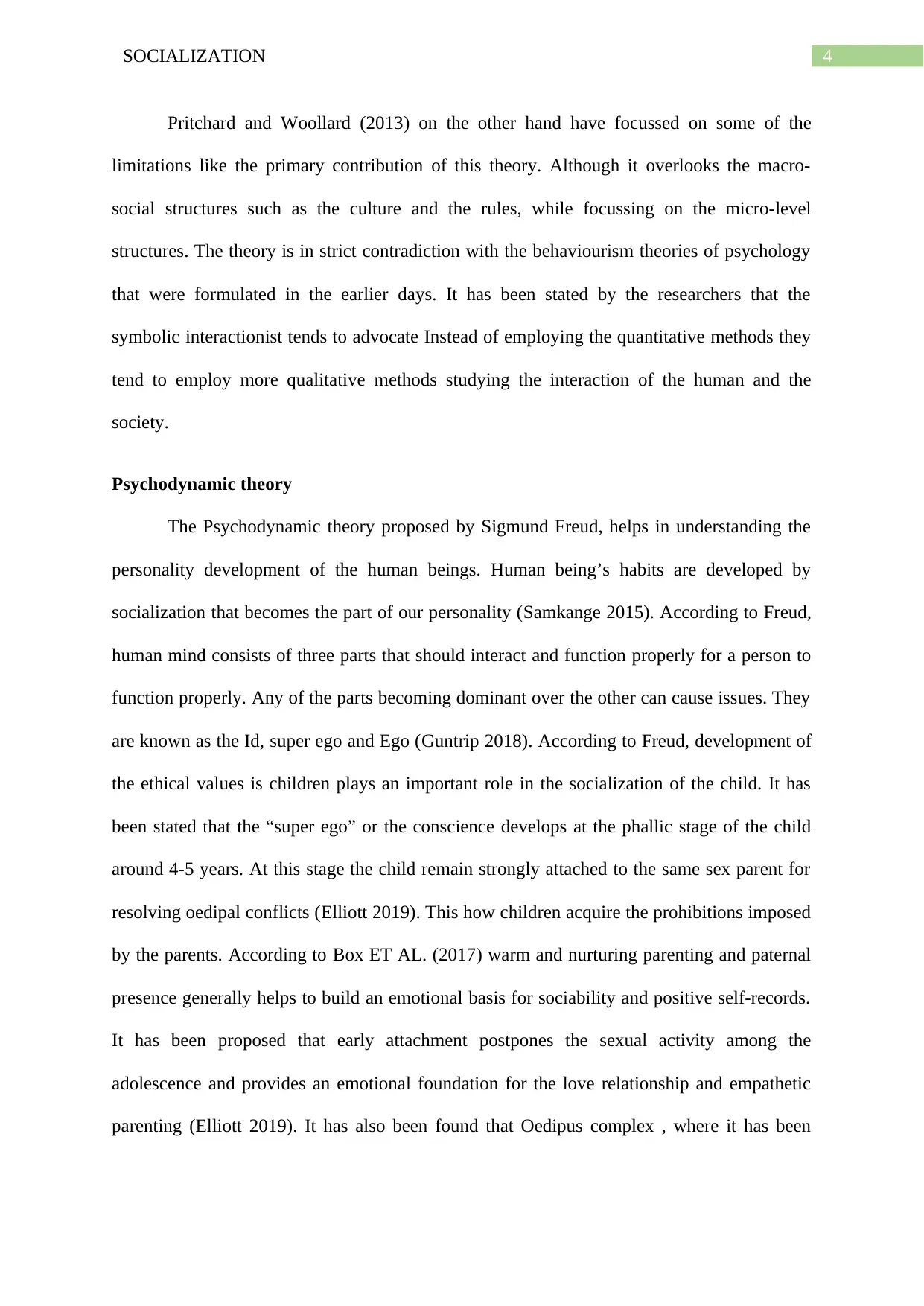
4SOCIALIZATION
Pritchard and Woollard (2013) on the other hand have focussed on some of the
limitations like the primary contribution of this theory. Although it overlooks the macro-
social structures such as the culture and the rules, while focussing on the micro-level
structures. The theory is in strict contradiction with the behaviourism theories of psychology
that were formulated in the earlier days. It has been stated by the researchers that the
symbolic interactionist tends to advocate Instead of employing the quantitative methods they
tend to employ more qualitative methods studying the interaction of the human and the
society.
Psychodynamic theory
The Psychodynamic theory proposed by Sigmund Freud, helps in understanding the
personality development of the human beings. Human being’s habits are developed by
socialization that becomes the part of our personality (Samkange 2015). According to Freud,
human mind consists of three parts that should interact and function properly for a person to
function properly. Any of the parts becoming dominant over the other can cause issues. They
are known as the Id, super ego and Ego (Guntrip 2018). According to Freud, development of
the ethical values is children plays an important role in the socialization of the child. It has
been stated that the “super ego” or the conscience develops at the phallic stage of the child
around 4-5 years. At this stage the child remain strongly attached to the same sex parent for
resolving oedipal conflicts (Elliott 2019). This how children acquire the prohibitions imposed
by the parents. According to Box ET AL. (2017) warm and nurturing parenting and paternal
presence generally helps to build an emotional basis for sociability and positive self-records.
It has been proposed that early attachment postpones the sexual activity among the
adolescence and provides an emotional foundation for the love relationship and empathetic
parenting (Elliott 2019). It has also been found that Oedipus complex , where it has been
Pritchard and Woollard (2013) on the other hand have focussed on some of the
limitations like the primary contribution of this theory. Although it overlooks the macro-
social structures such as the culture and the rules, while focussing on the micro-level
structures. The theory is in strict contradiction with the behaviourism theories of psychology
that were formulated in the earlier days. It has been stated by the researchers that the
symbolic interactionist tends to advocate Instead of employing the quantitative methods they
tend to employ more qualitative methods studying the interaction of the human and the
society.
Psychodynamic theory
The Psychodynamic theory proposed by Sigmund Freud, helps in understanding the
personality development of the human beings. Human being’s habits are developed by
socialization that becomes the part of our personality (Samkange 2015). According to Freud,
human mind consists of three parts that should interact and function properly for a person to
function properly. Any of the parts becoming dominant over the other can cause issues. They
are known as the Id, super ego and Ego (Guntrip 2018). According to Freud, development of
the ethical values is children plays an important role in the socialization of the child. It has
been stated that the “super ego” or the conscience develops at the phallic stage of the child
around 4-5 years. At this stage the child remain strongly attached to the same sex parent for
resolving oedipal conflicts (Elliott 2019). This how children acquire the prohibitions imposed
by the parents. According to Box ET AL. (2017) warm and nurturing parenting and paternal
presence generally helps to build an emotional basis for sociability and positive self-records.
It has been proposed that early attachment postpones the sexual activity among the
adolescence and provides an emotional foundation for the love relationship and empathetic
parenting (Elliott 2019). It has also been found that Oedipus complex , where it has been
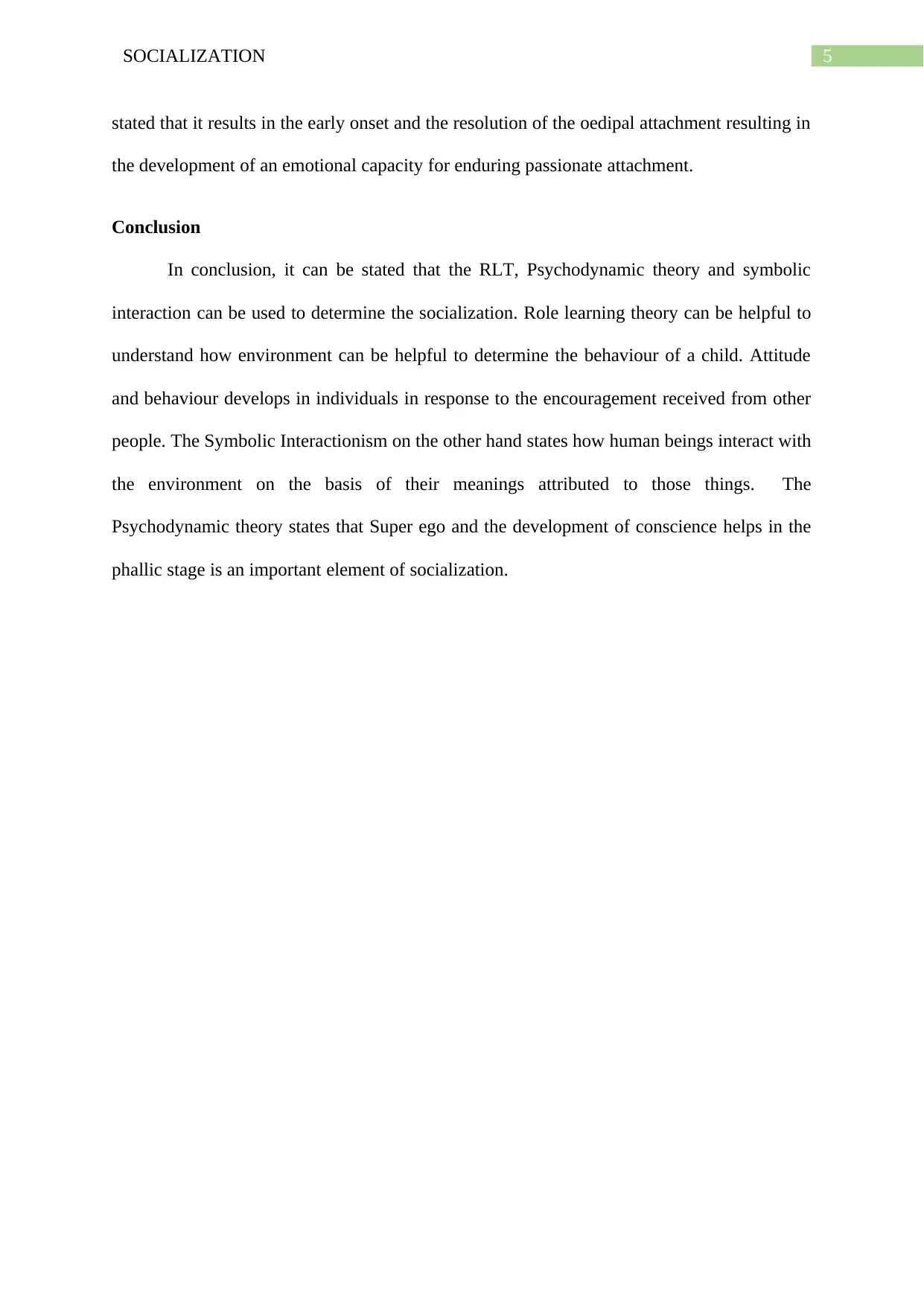
5SOCIALIZATION
stated that it results in the early onset and the resolution of the oedipal attachment resulting in
the development of an emotional capacity for enduring passionate attachment.
Conclusion
In conclusion, it can be stated that the RLT, Psychodynamic theory and symbolic
interaction can be used to determine the socialization. Role learning theory can be helpful to
understand how environment can be helpful to determine the behaviour of a child. Attitude
and behaviour develops in individuals in response to the encouragement received from other
people. The Symbolic Interactionism on the other hand states how human beings interact with
the environment on the basis of their meanings attributed to those things. The
Psychodynamic theory states that Super ego and the development of conscience helps in the
phallic stage is an important element of socialization.
stated that it results in the early onset and the resolution of the oedipal attachment resulting in
the development of an emotional capacity for enduring passionate attachment.
Conclusion
In conclusion, it can be stated that the RLT, Psychodynamic theory and symbolic
interaction can be used to determine the socialization. Role learning theory can be helpful to
understand how environment can be helpful to determine the behaviour of a child. Attitude
and behaviour develops in individuals in response to the encouragement received from other
people. The Symbolic Interactionism on the other hand states how human beings interact with
the environment on the basis of their meanings attributed to those things. The
Psychodynamic theory states that Super ego and the development of conscience helps in the
phallic stage is an important element of socialization.
⊘ This is a preview!⊘
Do you want full access?
Subscribe today to unlock all pages.

Trusted by 1+ million students worldwide
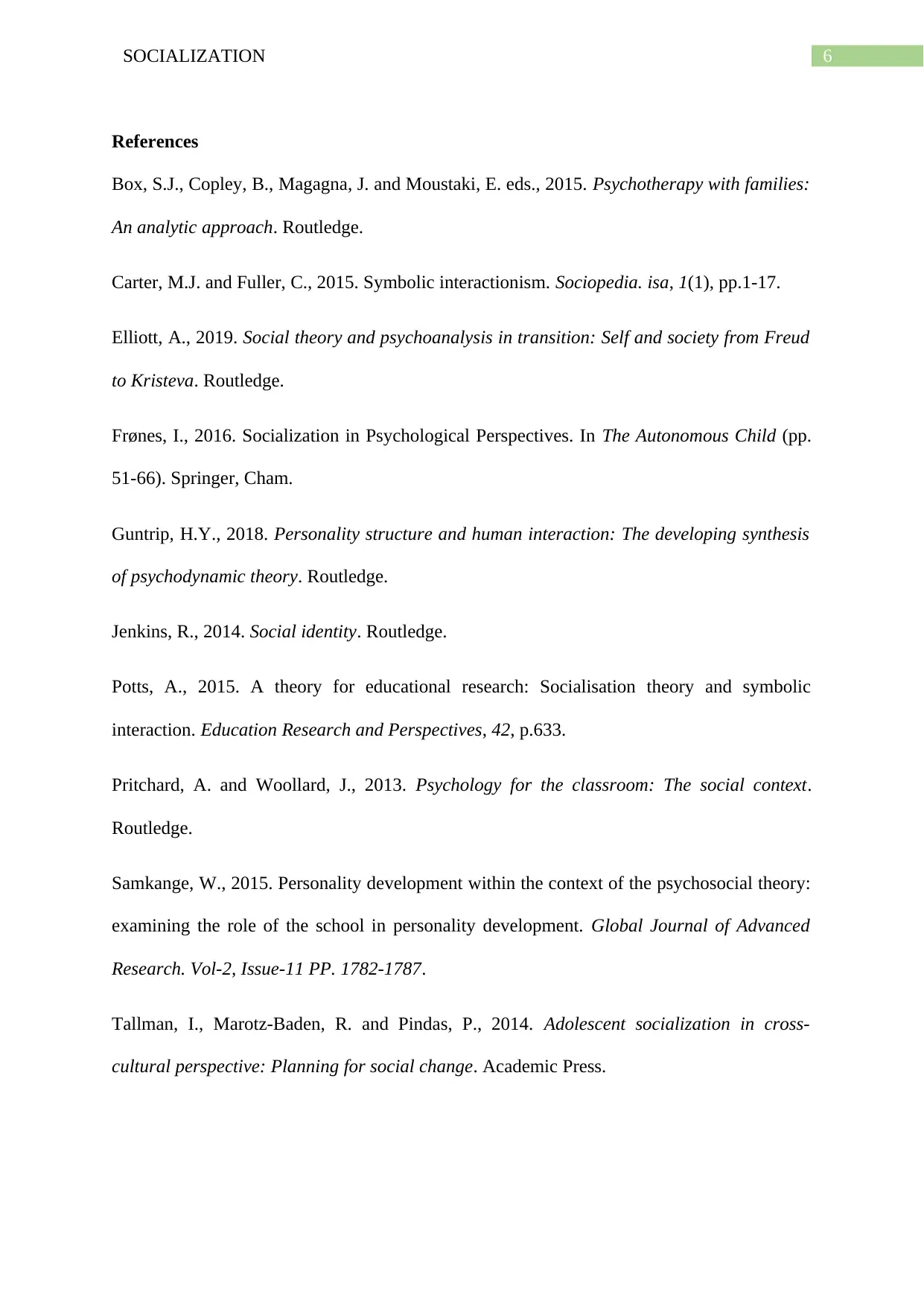
6SOCIALIZATION
References
Box, S.J., Copley, B., Magagna, J. and Moustaki, E. eds., 2015. Psychotherapy with families:
An analytic approach. Routledge.
Carter, M.J. and Fuller, C., 2015. Symbolic interactionism. Sociopedia. isa, 1(1), pp.1-17.
Elliott, A., 2019. Social theory and psychoanalysis in transition: Self and society from Freud
to Kristeva. Routledge.
Frønes, I., 2016. Socialization in Psychological Perspectives. In The Autonomous Child (pp.
51-66). Springer, Cham.
Guntrip, H.Y., 2018. Personality structure and human interaction: The developing synthesis
of psychodynamic theory. Routledge.
Jenkins, R., 2014. Social identity. Routledge.
Potts, A., 2015. A theory for educational research: Socialisation theory and symbolic
interaction. Education Research and Perspectives, 42, p.633.
Pritchard, A. and Woollard, J., 2013. Psychology for the classroom: The social context.
Routledge.
Samkange, W., 2015. Personality development within the context of the psychosocial theory:
examining the role of the school in personality development. Global Journal of Advanced
Research. Vol-2, Issue-11 PP. 1782-1787.
Tallman, I., Marotz-Baden, R. and Pindas, P., 2014. Adolescent socialization in cross-
cultural perspective: Planning for social change. Academic Press.
References
Box, S.J., Copley, B., Magagna, J. and Moustaki, E. eds., 2015. Psychotherapy with families:
An analytic approach. Routledge.
Carter, M.J. and Fuller, C., 2015. Symbolic interactionism. Sociopedia. isa, 1(1), pp.1-17.
Elliott, A., 2019. Social theory and psychoanalysis in transition: Self and society from Freud
to Kristeva. Routledge.
Frønes, I., 2016. Socialization in Psychological Perspectives. In The Autonomous Child (pp.
51-66). Springer, Cham.
Guntrip, H.Y., 2018. Personality structure and human interaction: The developing synthesis
of psychodynamic theory. Routledge.
Jenkins, R., 2014. Social identity. Routledge.
Potts, A., 2015. A theory for educational research: Socialisation theory and symbolic
interaction. Education Research and Perspectives, 42, p.633.
Pritchard, A. and Woollard, J., 2013. Psychology for the classroom: The social context.
Routledge.
Samkange, W., 2015. Personality development within the context of the psychosocial theory:
examining the role of the school in personality development. Global Journal of Advanced
Research. Vol-2, Issue-11 PP. 1782-1787.
Tallman, I., Marotz-Baden, R. and Pindas, P., 2014. Adolescent socialization in cross-
cultural perspective: Planning for social change. Academic Press.
1 out of 7
Related Documents
Your All-in-One AI-Powered Toolkit for Academic Success.
+13062052269
info@desklib.com
Available 24*7 on WhatsApp / Email
![[object Object]](/_next/static/media/star-bottom.7253800d.svg)
Unlock your academic potential
Copyright © 2020–2026 A2Z Services. All Rights Reserved. Developed and managed by ZUCOL.




